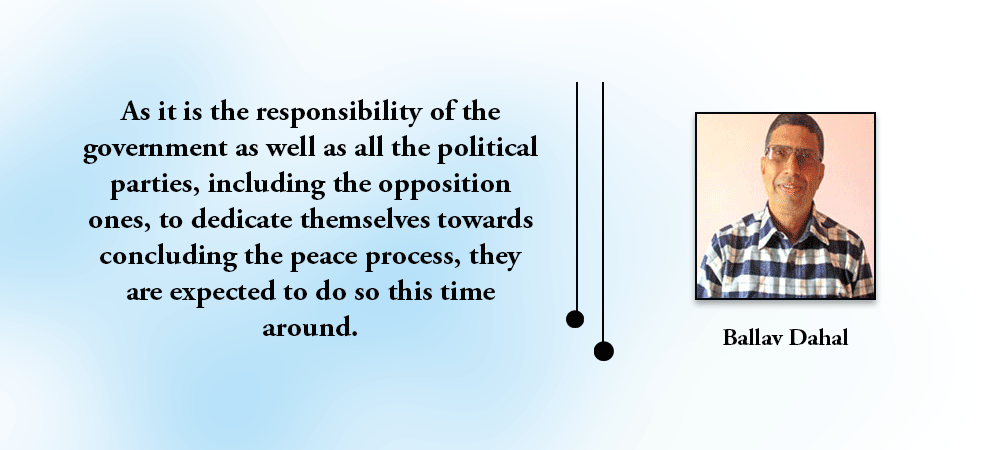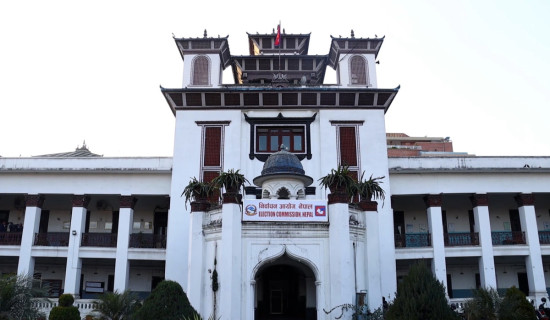- Sunday, 8 February 2026
Conclude Peace Process In Earnest
Sixteen long years have elapsed since the signing of the Comprehensive Peace Accord (CPA) between the then government and the erstwhile Communist Party of Nepal (Maoist). It needs no reiteration that the CPA was a major breakthrough in terms of making an end to the decade-long internal conflict in Nepal. But, it is unfortunate that the conflict victims and their families have yet to get transitional justice. Based on that pact, the nation was supposed to conclude the peace process as soon as possible in order to establish durable peace by healing all of their ordeals and traumas. However, some of the important tasks like bringing the rebel force into the mainstream politics and managing arms and ex-Maoist combatants were accomplished. The international community also played a significant role in conflict resolution.
As per the spirit of the CPA, the valid issue of transitional justice had to be settled through formulating necessary laws and establishing transitional justice apparatus. It appears that the responsible political parties did not attach much importance to this sensitive matter. Their growing interest in power politics was responsible for the stalled peace process. It took almost eight years for the nation to have the much-needed Act on the Commission on Investigation of Disappeared Persons, Truth and Reconciliation after having struck the CPA. The two transitional justice agencies — Truth and Reconciliation Commission (TRC) and the Commission for Investigation on Enforced Disappeared Persons (CIEDP) — came into being only in 2015. The law had mandated those bodies to accelerate the process of delivering transitional justice to the conflict victims and their kith and kin.
Key pillars
Transitional justice refers to the range of existing judicial and other tools that alleviate wounds, promote social dialogue and ensure the rule of law and accountability. Actually, this form of justice deals with the root causes of the conflict like inequalities, discriminations and suppressions in order to prevent the possible recurrence of violence and to build enduring peace. The United Nations has identified four key pillars of transitional justice — truth, justice, reparation and guarantee of non-recurrence of the conflict. It is essential for all parties to the conflict to acknowledge truth on the violations committed. There is no denying that the victims and their families have the right to make their voices heard and their questions responded properly. Truth is regarded as the first step towards social dialogue as well as reconciliation.
When robust accountability mechanisms are put in place, atrocities rarely go unnoticed as perpetrators of gross human rights violations are identified and prosecuted, delivering justice to the concerned persons and/or families. So, justice is vital for preventive as well as reparative purpose. Reparations should be given to the victims and their families for the harm they suffered. Reparation measures are more than economic compensations. Such measures aim at improving the life of the victims and their families. Institutional reforms are equally important when it comes to preventing the gross human rights violations in the future. Such reforms ensure accountability, transparency and fairness.
In the context of Nepal, the two transitional justice agencies have made some progress. However, much still remains to be done. The TRC has received as many as 60,000 complaints while some 3,200 cases have been registered with the CIEDP. There is no doubt that the conflict era was so painful that over 17,000 people were killed. Those who lost their lives included civilians, insurgents, and security personnel. And the conflict also left thousands of others maimed. In addition, hundreds of thousands of rural people were displaced. There were numerous incidences of torture, abduction, sexual harassment and extortion.
Because the process of delivering transitional justice has failed to take desired momentum, the conflict victims and their families have gone on voicing for justice. They have been piling pressure on the government as well as the leadership of the political parties to provide them with justice at different forums. Even the major political parties have time and again expressed their commitments to finishing the protracted peace process in order to advance the nation to an era of durable peace and development.
Amendment bill
A couple of days ago, nine different political parties, including the Nepali Congress (NC), CPN-Maoist Centre, Janata Samajbadi Party and CPN-Unified Socialist, promised to begin carrying out the remaining tasks of the peace process immediately and complete them within next two years. In line with this determination, the federal government has lately registered a bill at the House of Representatives to amend the Act related to the Commission on Investigation of Disappeared Persons, Truth and Reconciliation. The bill proposes incorporating the killings of unarmed persons, sexual abuses and other atrocities in the list of human rights violations. Earlier, such cases had been put in the list of grave rights violations. In August last year, a bill with almost similar contents could not get through the parliamentary committee due to a lack of political consensus. The bill got stuck in the House committee as the members of the panel failed to forge consensus on some contentious matters, including classification of the conflict-era cases and hearing of appeals of the decisions made by the Special Court.
The new bill, however, includes the provision of an appeal of rights. The bill also suggests classifying the cases into two types — grave violation of human rights and violation of human rights. The bill also possesses the victim’s right to reparation. As it is the responsibility of the government as well as all the political parties, including the opposition ones, to dedicate themselves towards concluding the peace process, they are expected to do so this time around. With the conclusion of this significant task, the nation is expected to enter the phase of enduring peace, political stability, development and prosperity.
(Dahal is a deputy executive editor of this daily.)
















